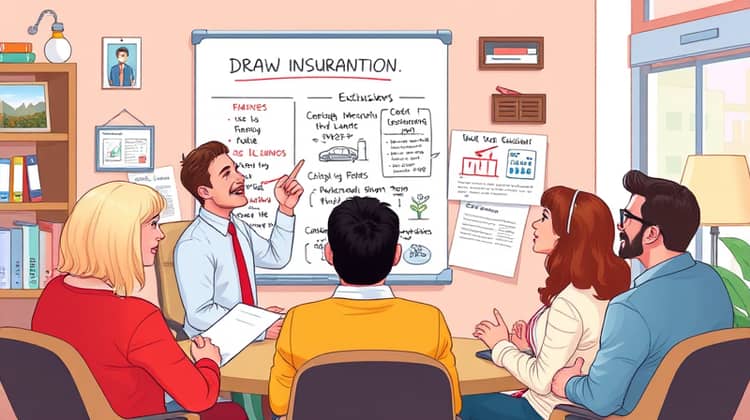When it comes to navigating the ins and outs of your insurance policy, having a clear understanding is crucial. Ensuring that you are adequately covered while also finding the best options for premiums and deductibles is necessary. Therefore, asking the right questions to your insurance agent can lead to a more informed and beneficial insurance experience.
This article outlines seven critical questions you should ask your insurance agent. These questions are aimed at clarifying what your policy entails, understanding any potential exclusions, and navigating the claims process more effectively. By empowering yourself with this knowledge, you can avoid surprises and ensure that your insurance meets your needs.
When in doubt, don’t hesitate to reach out to your insurance agent. They are there to help you make sense of your coverage and to assist you in tailoring your policy to your specific requirements. Let's explore the essential questions that can guide you through this important conversation.
1. What Does My Policy Cover?

Understanding exactly what your policy covers is one of the most important components of having insurance. Coverage can vary significantly between different policies and providers, so it's crucial to get detailed information from your insurance agent.
Your agent should provide a clear breakdown of covered events, damages, and services. This can include everything from property damage to liability coverage, and even personal injuries, depending on the policy type.
By clarifying these details, you can ensure that you have the protection you need and avoid gaps in coverage that could leave you vulnerable.
- Comprehensive vehicle coverage
- Property damage liability
- Medical expenses for injuries
2. What Are the Exclusions and Limitations?

While it's important to know what your policy covers, understanding what it does not cover is equally crucial. Many policies include specific exclusions that limit coverage under certain circumstances, and it's essential to be aware of these limitations.
Your insurance agent should outline these exclusions to help you understand any potential risks you may face. This knowledge enables you to either take precautions or consider additional coverage options.
Don’t be afraid to ask for examples of situations where coverage would not apply. This will further clarify the limitations of your policy and help you make informed decisions regarding additional coverage if necessary.
3. How Does the Claims Process Work?

The claims process can often be a confusing aspect of insurance that many policyholders don’t fully understand until it’s too late. Therefore, discussing this with your insurance agent is essential to gain a better understanding of the steps involved.
Your agent should explain how to file a claim, the required documentation, and the timeframes involved in processing claims. This knowledge can alleviate stress if you ever need to file a claim.
Understanding the claims process also helps set your expectations for how long it may take to receive compensation for any losses, ensuring you're prepared for that situation.
- Notify your insurance company about the claim.
- Gather necessary documentation, including receipts and police reports (if applicable).
- Submit the completed claim form with all supporting documents.
- Wait for the insurance adjuster to assess the claim.
- Receive payment or explanation of the outcome.
4. What Are My Premium and Deductible Options?

Insurance premiums and deductibles directly impact the affordability of your policy. Knowing your options can help you tailor coverage that best fits your budget and financial situation.
- Annual versus monthly premium payments
- Higher premiums with lower deductibles or vice versa
- Potential increases in premiums after claims
5. Are There Any Discounts Available?

Many insurance providers offer a variety of discounts that can help lower your premium costs. Asking your agent about available discounts is always a smart move, as these can lead to significant savings.
Discounts may range from safe driving records to bundling multiple policies with the same provider. Inquiring about specific qualifications you may meet can directly affect your premiums.
6. Can My Policy be Customized?

Every individual’s insurance needs can vary significantly, which is why customization is key. Discussing customization options with your insurance agent allows you to tailor your policy according to personal requirements and lifestyles.
Your agent should help you understand how to adjust coverage levels, add riders, or remove unnecessary coverages that don't match your needs, ensuring you only pay for what you actually use.
It's helpful to discuss your circumstances, such as changes in lifestyle, assets, or risks that may necessitate amendments to your policy in the future.
Your agent can guide you on how often you should review your policy to ensure it always matches your current situation and preferences.
7. What Happens When My Policy Needs Change?

Insurance needs can change due to various life events, such as marriage, purchasing a home, or adding a child to your family. It's essential to communicate these changes to your insurance agent promptly.
Your agent should explain how to adjust your coverage as your situation evolves and ensure that your policy remains suitable and provides adequate protection.
Regularly reviewing your policy—perhaps annually or after significant life events—will help maintain optimal coverage.
- Notify your agent about any major life changes.
- Review your coverage adequacy regularly.
- Adjust your policy to fit new needs.
Conclusion

Asking the right questions when consulting your insurance agent can make a significant difference in your overall satisfaction and security regarding your insurance policy. By fully understanding your coverage details, exclusions, claims process, and customization options, you can make informed decisions that benefit you in the long run.
Remember, insurance is not just about protecting your assets; it is also about ensuring peace of mind in times of need. Empower yourself with knowledge and maintain an open dialogue with your insurance agent to adapt your policy as needed.














